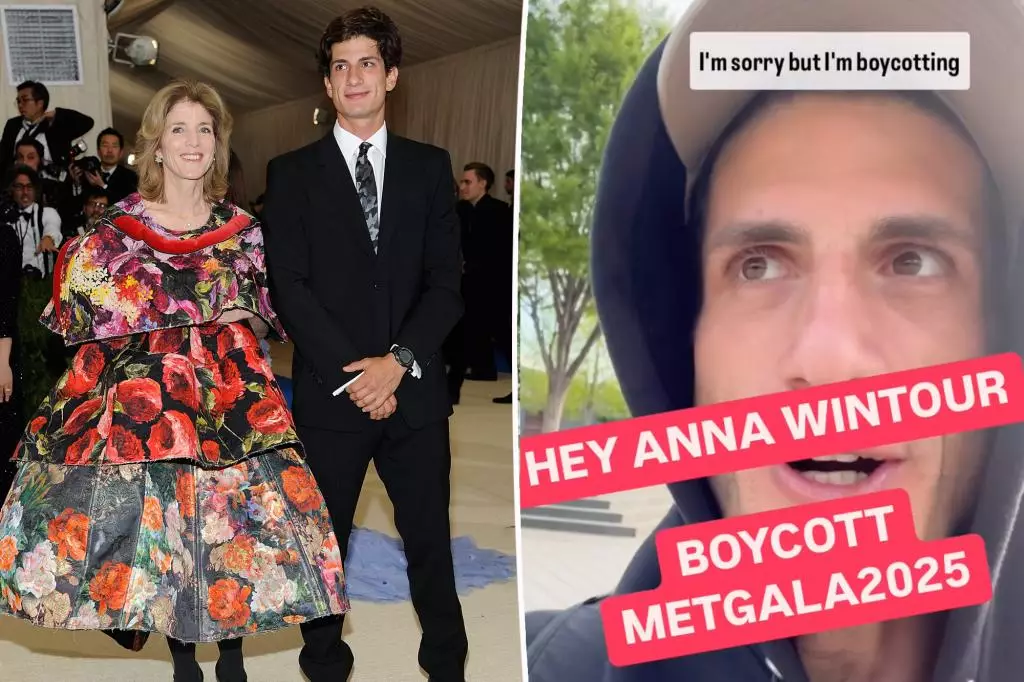In the world of high fashion and glamorous soirées, the Met Gala often stands as a coliseum where the elite of society converge, showcasing extravagant outfits and star-studded connections. This year, however, the spotlight shifted slightly when Jack Schlossberg, the grandson of John F. Kennedy, decided to make headlines through a social media tirade, declaring his boycott of the event. Interestingly, his declaration raised eyebrows primarily because he wasn’t invited to the gala to begin with—a fact reported by reliable sources, which added a layer of irony to his loud protestations.
Schlossberg’s declaration of a boycott highlights dual aspects of his character: a desire to carve out his own social identity while also positioning himself as a voice for political and social activism. He claims that the excesses of the gala are misplaced, given the turmoil occurring both domestically and globally. This stance illustrates a common dilemma among young influencers navigating the fine line between personal branding and genuine activism. It’s compelling to witness someone from such a storied lineage leverage their platform in a bid to draw attention to pressing global issues, yet one cannot help but question the sincerity behind his effort.
Digging Deeper: The Nature of Invitations at the Met Gala
The Met Gala operates as more than just a social gathering; it’s a complex ecosystem where invitations are tied intricately to partnerships with designers and brands. A source familiar with the gala’s inner workings clarified that every seat at the event is essentially “purchased” by a designer or brand. This exclusivity makes Schlossberg’s outcry seem even more performative, as it’s clear that his presence was contingent on associations rather than intrinsic merit.
Schlossberg attended in 2017 as a plus-one to his mother, Caroline Kennedy, but the idea that he sees himself as a rightful guest warrants scrutiny. In his posts, he leverages social media to condemnation, positioning Vogue and the Met Gala as complicit institutions resisting meaningful political discourse. This perspective feels somewhat paradoxical, considering Schlossberg’s own history of association with Vogue—having worked there during the tumultuous 2024 election cycle.
A Platform for Change or a Marketing Move?
While Schlossberg’s posts resonate with an undercurrent of activism, one might argue that employing the Met Gala discourse primarily as a promotional vehicle for his upcoming projects can dilute the message he’s attempting to communicate. In a recent post, he stated that he would be producing informative content on his own news platform as an alternative to participating in the gala. The question that lingers: Is this rebellion an authentic call for change or simply a clever marketing strategy masquerading as activism?
Critics could contend that Schlossberg’s tantrum is reminiscent of the age-old complaint about “celebrity activists”—individuals whose privileged backgrounds afford them platforms to speak on issues that might be lost on the common man. Are his expressions of discontent really in solidarity with the marginalized groups he mentions, or are they a mere self-serving ploy? It’s essential to weigh the impact of such protests against the actions—intentions must stand against the scrutiny of consequences.
The Tension Between Fashion and Activism
It’s intriguingly ironic that Schlossberg’s protest occurs within the context of a gala dedicated to the fine art of tailoring and fashion. This year’s theme, “Superfine: Tailoring Black Style,” aims to celebrate Black culture and craftsmanship within the industry. Schlossberg’s criticisms of Vogue for their lack of engagement in meaningful issues paints a broader picture of the fashion world—a domain often critiqued for its superficiality.
Ultimately, the fashion industry has wrestled with the demands for greater social responsibility for years, but meaningful change often happens quietly and behind the scenes. Schlossberg’s vocal stance, paired with his history at Vogue, spotlights a critical tension: can an industry rife with privilege and profit pivot toward genuine discourse on societal problems? His call for Vogue to utilize its platform in a more socially conscious manner could serve as a timely reminder, yet it also risks being overshadowed by the spectacle of the gala itself.
The discourse surrounding Schlossberg’s boycott raises more questions than it answers. Is it ever appropriate to intertwine fashion with activism? If so, who decides the sincerity and merits of such efforts? As young influencers like Schlossberg step into the fray, the intersection of their familial legacies, public personas, and activist ambitions will continue to shape conversations around both social issues and the often frivolous world of high fashion.

